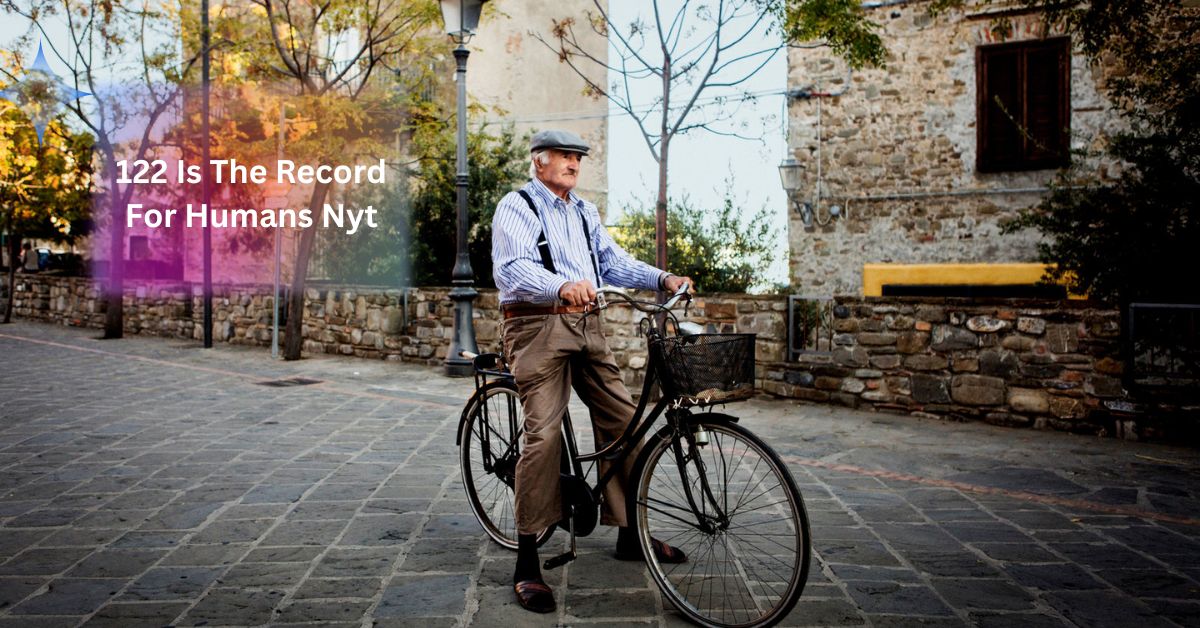122 Is The Record For Humans Nyt: The True Story Behind The Crossword Puzzle Hint
122 is the Record for Humans NYT—this intriguing crossword clue from the New York Times Mini Crossword might leave some solvers scratching their heads.
122 is the Record for Humans NYT refers to Jeanne Calment, who holds the record for the longest verified human lifespan at 122 years. This highlights extraordinary longevity and sparks interest in the science of aging.
Join us as we uncover what makes 122 years such a monumental achievement and what it teaches us about the potential for human longevity.
The Crossword Clue: What Does 122 Represent?
Clue Breakdown:
The NYT crossword clue “122 is the record for humans” has the answer “AGE.” This clue cleverly uses the number 122 to refer to the record for human longevity, indicating how long a person has lived. In the world of crosswords, such clues often combine numbers and words to reflect real-world trivia or historical records. Here, the number 122 highlights a significant milestone in the human lifespan, bringing attention to remarkable longevity.
Context Of The Clue:
This particular clue appeared in the NYT Mini Crossword on February 23, 2024. The NYT Mini Crossword, known for its brief and engaging puzzles, often includes clues that reference current events, historical records, or intriguing facts. The inclusion of this clue not only challenges solvers but also educates them about noteworthy achievements in human history, such as Jeanne Calment’s record-breaking age.
The Record: Jeanne Calment’s 122-Year Milestone:
The Record Holder:
Jeanne Calment, a French woman born on February 21, 1875, holds the record for the longest verified human lifespan, living to the extraordinary age of 122 years. Her life spanned three centuries, and she became a global symbol of longevity. Born in Arles, France, Jeanne Calment witnessed significant historical events, including both World Wars and the invention of the automobile and airplane.
Key milestones in her life include meeting Vincent van Gogh as a young girl and outliving her daughter, who passed away in 1934. Her longevity was celebrated worldwide, making her an icon in the study of aging.
Significance Of The Record:
Reaching 122 years is a remarkable achievement, as it represents the outer limits of the human lifespan observed and verified. Jeanne Calment’s record provides valuable insights into the potential for human longevity and the factors that might contribute to an extended life. Her longevity challenges our understanding of aging and longevity, prompting researchers to explore the biological, environmental, and lifestyle factors that can influence how long we live. The record also highlights the importance of studying exceptional cases to gain a deeper understanding of human aging and to explore ways to improve quality of life in our later years.
The Science Behind Longevity:
Understanding Longevity:
Reaching an advanced age involves a complex interplay of factors, including genetics, environment, lifestyle, and healthcare. Key elements contributing to longevity include maintaining a healthy diet rich in nutrients, regular physical activity, and effective stress management. Additionally, strong social connections and a positive mental attitude are crucial for promoting long-term health. Scientific research also emphasizes the role of preventive healthcare and access to medical advancements in extending life expectancy.
Key Scientific Research On Aging And Longevity:
Recent studies have provided valuable insights into the biology of aging. Research into cellular mechanisms, such as telomere shortening and oxidative stress, has enhanced our understanding of why aging occurs and how it might be mitigated. The study of centenarians like Jeanne Calment has revealed patterns and genetic markers associated with exceptional longevity, shedding light on the factors that contribute to living beyond the average lifespan.
Genetics Vs. Lifestyle:
Genetics plays a significant role in determining potential lifespan, influencing susceptibility to age-related diseases and overall health. However, lifestyle choices have a profound impact as well. Factors such as diet, exercise, and stress management can either amplify or mitigate genetic predispositions. While genetics set certain boundaries, adopting healthy habits can greatly enhance the quality of life and longevity, demonstrating that lifestyle choices are critical in achieving and surpassing average life expectancy.
Other Notable Longevity Records:
Sarah Knauss (119 Years):
Sarah Knauss, born on September 24, 1880, in the United States, lived to be 119 years old. Known for her calm demeanor and strong faith, Knauss attributed her longevity to a positive outlook on life and a diet of simple, wholesome foods. She was recognized for her warm personality and maintained mental sharpness well into her later years.
Jiroemon Kimura (116 Years):
Jiroemon Kimura, born on April 19, 1897, in Japan, holds the record for the longest verified lifespan for a man at 116 years. Kimura led a simple life in a rural area, enjoying a diet rich in vegetables and fish. His longevity has been attributed to his active lifestyle, strong family bonds, and a positive attitude toward life.
Nabi Tajima (117 Years):
Nabi Tajima, born on August 4, 1900, in Japan, reached the age of 117. Known for her love of sumo wrestling and family gatherings, Tajima’s longevity was often attributed to her social engagement and balanced lifestyle. She enjoyed a diet that included traditional Japanese foods and was actively involved in her community.
Violet Brown (117 Years):
Violet Brown, born on March 10, 1900, in Jamaica, lived to be 117 years old. She attributed her longevity to a hardworking life on her farm and a diet that included natural, homegrown foods. Her strong faith and close family ties also played a significant role in her extended lifespan, making her an admired figure in her community.
Factors Contributing To Longevity:
Diet And Nutrition:
Diet plays a crucial role in promoting longevity. Long-lived individuals often follow diets rich in fruits, vegetables, whole grains, and lean proteins. Common dietary practices include consuming moderate amounts of healthy fats, such as those from olive oil and nuts, and limiting processed foods and sugars. Many centenarians also adhere to traditional diets that emphasize balance and moderation, often incorporating local, natural foods that are minimally processed.
Physical Activity:
Regular physical activity is a hallmark of longevity. Centenarians commonly engage in moderate exercise such as walking, gardening, or low-impact sports. Their activities help maintain cardiovascular health, muscle strength, and flexibility. Consistent movement, rather than intense exercise, is a key factor, as it supports overall well-being and prevents the decline associated with sedentary lifestyles.
Social And Emotional Health:
Social connections and emotional well-being are vital for longevity. Long-lived individuals typically have strong family bonds and active social lives. Engaging in regular social activities and maintaining positive relationships contribute to lower stress levels and increased life satisfaction. Additionally, a positive outlook and mental resilience play significant roles in sustaining health and well-being throughout advanced age.
Myths And Realities Of Aging:
Common Myths:
Several myths about aging persist, often misleading people about what to expect as they grow older. A prevalent myth is that genetics alone determine how long one will live, overshadowing the impact of lifestyle choices. Another misconception is that aging inevitably leads to a decline in health and independence, suggesting that reaching old age means becoming frail and dependent. Additionally, there is a belief that only extreme diets or interventions can extend lifespan, ignoring the benefits of moderate, balanced approaches.
Realities Of Aging:
Evidence shows that while genetics play a role in longevity, lifestyle choices significantly influence health and vitality in old age. Maintaining a healthy diet, staying physically active, and managing stress can greatly impact overall well-being and longevity. Studies of centenarians reveal that a balanced lifestyle, strong social connections, and a positive attitude contribute to a fulfilling and healthy old age. Far from inevitable decline, many older adults enjoy vibrant, active lives, demonstrating that thoughtful lifestyle choices can enhance both quality and length of life.
Conclusion: Embracing The Record And Its Lessons:
The crossword clue “122 is the record for humans NYT” opens a window into the remarkable achievement of Jeanne Calment, who lived for 122 years. This record highlights the extraordinary potential of human longevity and catalyzes exploring the science behind aging. Factors such as diet, physical activity, and social connections play pivotal roles in extending lifespan, challenging common myths about aging. By understanding the blend of genetics and lifestyle, we gain valuable insights into how to live healthier and longer lives. Jeanne Calment’s legacy not only celebrates an impressive milestone but also inspires ongoing curiosity and research into the secrets of a long and fulfilling life.
Frequently Asked Questions (Faq):
1. What Is The Average Lifespan Globally?
The global average lifespan is approximately 72.6 years.
2. How Can One Increase Their Chances Of Living A Long Life?
Adopting a balanced diet, engaging in regular physical activity, maintaining strong social connections, and managing stress effectively can increase the likelihood of a longer life.
3. Are There Specific Regions Known For High Longevity Rates?
Yes, regions known as Blue Zones, such as Okinawa (Japan) and Sardinia (Italy), are famous for having high numbers of centenarians.
4. What Role Does Mental Health Play In Longevity?
Good mental health, including a positive outlook and resilience, is crucial for overall well-being and can contribute to a longer, healthier life.
5. Can Modern Medicine Significantly Extend Lifespan?
0Modern medicine can improve health outcomes and extend life by treating diseases and managing chronic conditions, but lifestyle choices also play a crucial role.






